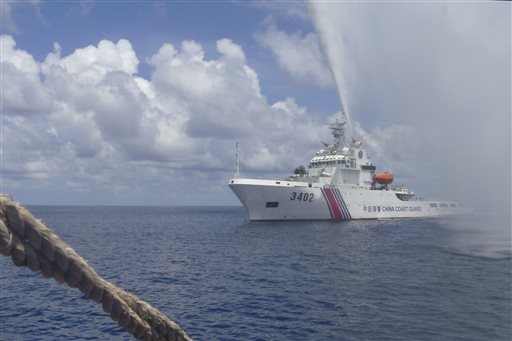Popular Reads
Top Results
Can't find what you're looking for?
View all search resultsPopular Reads
Top Results
Can't find what you're looking for?
View all search resultsChina sticks to its guns on SCS, US steps up pressure
Change text size
Gift Premium Articles
to Anyone
C
hina has strongly defended its claim on the South China Sea (SCS) at the Asian Security Summit, while the US stepped up pressure to stop illegal activities and militarization in the disputed waters.
The decades-old SCS issue was among the main topics at this year’s summit, dubbed the Shangri-La Dialogue (SLD), which ended on Sunday. The event, held in Singapore, was attended by global military chiefs and security analysts.
After receiving strong criticism from the US, Vietnam, Japan, India, France, the UK, the Philippines and Australia, the bellicose China reiterated its position at the summit that it respected international laws and strongly defended its sovereignty in the SCS.
"We do not make trouble, but we have no fear of trouble. China will not bear the consequences nor will it allow any infringement on its sovereignty and security interests, or stay indifferent to some countries creating chaos in the South China Sea," the head of the Chinese delegation, Adm. Sun Jianguo, said in his speech on Sunday in Singapore.
Sun, the deputy chief of the joint staff department of China's Central Military Commission, was responding to comments from US Secretary of Defense Ashton Carter, who said on Saturday at the SLD that Beijing risked erecting a “Great Wall of self-isolation” through its “expansive and unprecedented actions” in the disputed waters.
The US, which is not a claimant country in the SCS issue and has not taken a side in the dispute, also sent a strong signal that it would remain a guarantor of regional security.
“But, the United States will stand with regional partners to uphold core principles like freedom of navigation and overflight, and the peaceful resolution of disputes through legal means and in accordance with international law,” Carter said.
Vietnam, the second fiercest claimant on the SCS after China, said that Hanoi would not take sides in the dispute and called for the issue to be resolved in accordance with international laws such as the UN Convention on the Law of the Sea (UNCLOS) as well as peaceful regional-level negotiation between ASEAN and China.
Vinh fired shots at China by saying the latter’s acts of “unilateralism and coercion” in the SCS could lead to militarization of the region. “This development, if not addressed, is likely to lead to armed races, rivalry and unpredictable and disastrous consequences,” he said on Saturday.
Meanwhile, Indonesia and other ASEAN countries called for a peaceful solution to the SCS dispute and asked all claimant countries not to resort to provocative actions that may escalate tensions in the region.
“We must not allow the South China Sea dispute turn into a conflict. We must optimize our efforts to resolve the issue through peaceful means,” Indonesian Defense Minister Ryamizard Ryacudu said on Saturday.
Echoing a similar view, Thai Prime Minister Prayut Chan-o-cha, who delivered the keynote address on Friday, said ASEAN unity was important in order to create a new equilibrium in the region, adding that the SCS dispute must be resolved through peaceful means.
“We promote the freedom of overflight and navigation, and we support peaceful resolution of conflict in line with international law including the United Nations Convention on the Law of the Sea,” Prayut said.
Surprisingly, facing a legal dispute on the SCS at the international tribunal in The Hague, China claimed that it and ASEAN were capable of preserving peace in the region.
"China and ASEAN are capable of preserving peace and stability in the South China Sea through cooperation. Other countries should play a constructive role in this regard, not the other way around," Sun said.
Currently, China claims more than 85 percent of the SCS based on its 1947 nine-dash line, which is mostly based on historical rights, while other claimants (except Taiwan) refer to the UNCLOS and the 200 nautical mile exclusive economic zone. (ags)







